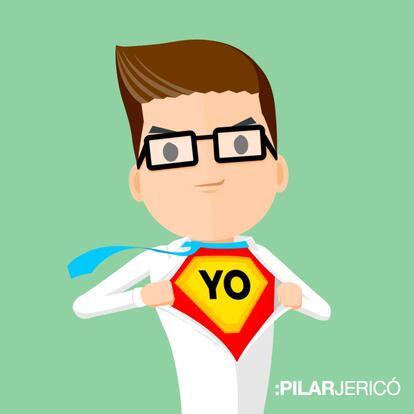It wasn’t your fault, but it is your responsibility
To achieve happiness we need to stop passing the buck and take action

If you want to waste your energy, blame the world for your problems. Looking to blame others is one of the most exhausting and fruitless exercises but we can all do it: when we fail an exam and say that it was because the professor made the questions impossibly difficult, when we fight with our significant other and blame it completely on their attitude, or when we decide that our happiness at work depends solely on our boss. We all have this tendency, but some do it so much, that they turn into professional “finger pointers.”
If you value being right over happiness, you will not be able to move forward
And while passing the buck might help us for a bit, it creates a larger problem: it weakens us, turns us into victims and makes us incapable of making decisions (as well as boring those around us). The key is to become the protagonist of your life, or in other words, transform blame into responsibility, as actor Will Smith argues in one of his most viral videos. Let’s take a look at how we can do this:
First, identify the moment where you become a “finger pointer.” As said before, we can all fall into this. It’s the moment where you repeatedly criticize others, and make it seem like you are innocent in a situation, whether it’s with family, friends, or in the workplace. Be aware of recurring conversations that leave you exhausted, furious or with a bad taste in your mouth (and in your listeners’). These are discussions that leave us empty and cannot be resolved.
Second, figure out what you want: is it being right or being happy? Be honest with yourself. We can criticize the people around us all we want, but words accomplish very little. What they can do is encourage action. If you value being right over your happiness and the happiness of those around you, you will not be able to move forward. However, if you want to feel better about yourself, more energized and in a better mood, then follow the next step.
Third, embrace acceptance. What’s in the past, is in the past. Will Smith sums it up perfectly in his video: it’s not your fault if your partner cheats on you or if your father is an alcoholic, but it is your responsibility to deal with the potential traumas so you can live a happy life. Not blaming others doesn’t mean putting a Band-Aid on and looking the other way. It means acknowledging what has happened, accepting it and finding space to take action.
Passing the buck weakens us and turns us into victims
And finally, identify what you can do. No excuses are acceptable here. Even people who have gone through the most terrible situations defend our freedom to act. Take Viktor Frankl, a Jewish psychiatrist who was a prisoner in Auschwitz during World War II. In the face of this terror, he maintained that we have the responsibility to choose our attitude and emotions. If this can be achieved in such dire moments, how could we possibly fail to adopt the same attitude when up against fights, mistakes, problems in the workplace or with our significant others? What’s more, when you start to assume responsibility in one area of your life, it will slowly extend to other aspects of it as well.
To sum up, when we blame the world for our problems, we attempt to shield ourselves from what hasn’t gone our way. But deep down, this defensive attitude comes at a very high price: it creates a void inside us and turns us into the slaves of criticism and negativity. That’s why asking ourselves what we can do and how we can take responsibility for what happens in our lives is the first step towards being happy and freeing ourselves from the past and our repetitive thinking.
English version by Laura Rodríguez.
Tu suscripción se está usando en otro dispositivo
¿Quieres añadir otro usuario a tu suscripción?
Si continúas leyendo en este dispositivo, no se podrá leer en el otro.
FlechaTu suscripción se está usando en otro dispositivo y solo puedes acceder a EL PAÍS desde un dispositivo a la vez.
Si quieres compartir tu cuenta, cambia tu suscripción a la modalidad Premium, así podrás añadir otro usuario. Cada uno accederá con su propia cuenta de email, lo que os permitirá personalizar vuestra experiencia en EL PAÍS.
¿Tienes una suscripción de empresa? Accede aquí para contratar más cuentas.
En el caso de no saber quién está usando tu cuenta, te recomendamos cambiar tu contraseña aquí.
Si decides continuar compartiendo tu cuenta, este mensaje se mostrará en tu dispositivo y en el de la otra persona que está usando tu cuenta de forma indefinida, afectando a tu experiencia de lectura. Puedes consultar aquí los términos y condiciones de la suscripción digital.








































